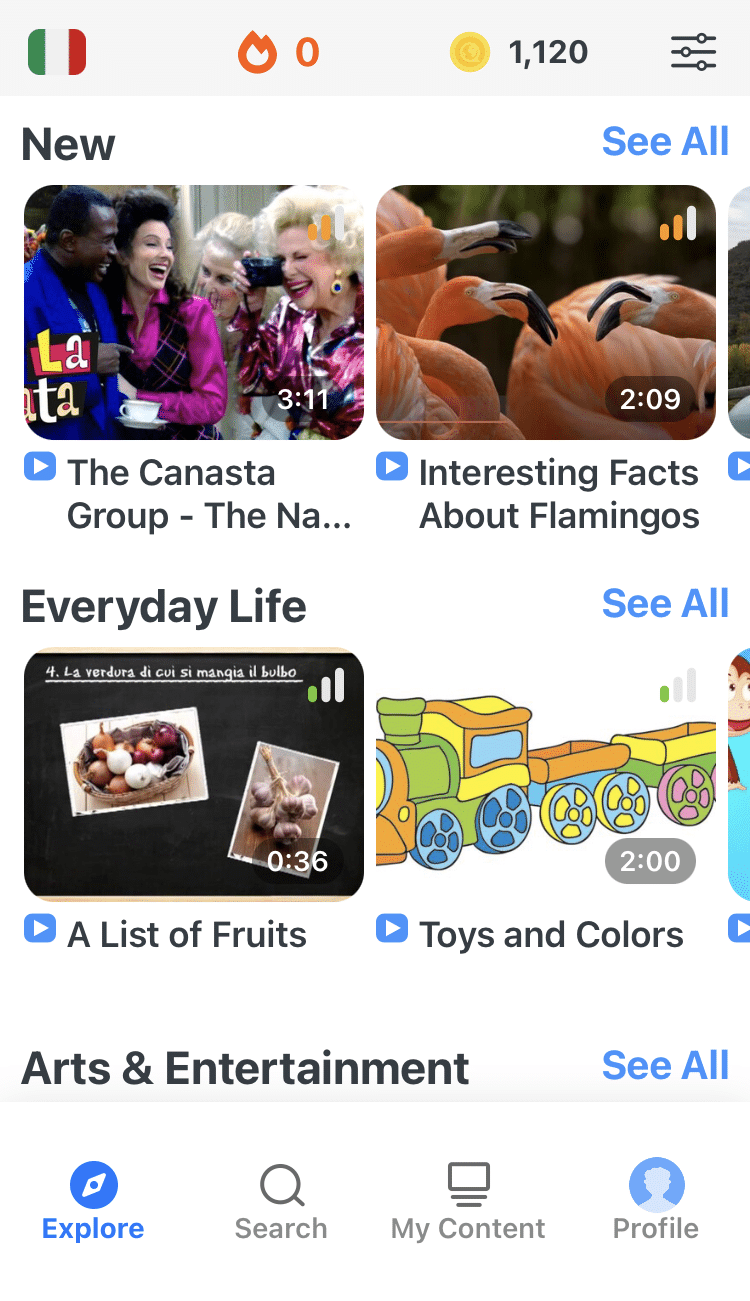
Family in Italian: 107 Italian Family Words to Make Your Nonna Proud
The word for family in Italian is la famiglia .
If you’re learning the Italian language, you’re also learning about the culture behind it, and family is a very important aspect of Italian culture.
In this post, we’re going to learn some vocabulary about the different members of the family in Italian—from your loving nonni (grandparents) to your marito (husband) or moglie (wife).
Contents
- Immediate Family Members
- Extended Family Members
- In-laws
- Stepfamily
- Adopted Family Members
- Other Family Members
- And One More Thing...
Download: This blog post is available as a convenient and portable PDF that you can take anywhere. Click here to get a copy. (Download)
Immediate Family Members
Immediate family members include parents, siblings, spouses and children. Some of the phrases used to refer to these family members include parenti stretti (lit. “tight relatives”), parenti prossimi (lit. “close relatives”) and parenti di primo grado (lit. “first-degree relatives”)
Italian Words for “Father”
There are many ways to refer to your father in Italian. For example, babbo is mostly used in Tuscany and other central regions of Italy, such as Umbria. In regions of northern and southern Italy it’s more common to say and hear papà .
| English Translation | Italian Singular | Italian Plural |
|---|---|---|
| father | padre | padri |
| father (informal) | babbo | babbi |
| father (informal) | papà | papà |
| father (informal) | papi | papi |
| father (informal) | papino | papini |
Italian Words for “Mother”
If you’ve grown up eating the most delicious food, and you haven’t been allowed to go out on a Saturday night because of unspeakable dangers, you’ve probably grown up with a loving mother—and a very Italian one, at that.
Mothers are such an important part of the family. In fact, there’s even an Italian term for “mama’s boys”—grown-up men who find it hard to leave the nest and still opt to live with their parents: mammoni (plural) or mammone (singular).
There’s no one quite like your mother. In Italy, they even have a saying:
Amor di madre, amore senza limiti. (A mother’s love has no limits.)
| English Translation | Italian Singular | Italian Plural |
|---|---|---|
| mother | madre | madri |
| mother (informal) | mammolina | mammoline |
| mother (informal) | mamma | mamme |
| mother (informal) | mammina | mammine |
Italian Words for Siblings
If you’ve ever had a sibling, you know they can be both protective and loving (and, okay, maybe a little annoying).
But when you grow up, you’ll find that, no matter what your differences were in your younger years, they can be great friends!
Also, if you belong to a stereotypically large Italian family (and make no mistake: Italian families tend to be smaller these days), you’ll also want to know how to refer to your siblings according to their birth order.
| English Translation | Italian Singular | Italian Plural |
|---|---|---|
| big brother | fratello maggiore (formal) fratellone (colloquial) | fratelloni |
| big sister | sorella maggiore (formal) sorellona (colloquial) | sorellone |
| brother | fratello | fratelli |
| sister | sorella | sorelle |
| eldest/firstborn (male) | primogenito | primogeniti |
| eldest/firstborn (female) | primogenita | primogenite |
| little brother | fratellino | fratellini |
| little sister | sorellina | sorelline |
| middle child | di mezzo | di mezzo |
| second-born (male) | secondogenito | secondogeniti |
| second-born (female) | secondogenita | secondogenite |
| third-born (male) | terzogenito | terzogeniti |
| third-born (female) | terzogenita | terzogenite |
| fourth-born (male) | quartogenito | quartogeniti |
| fourth-born (female) | quartogenita | quartogenite |
| fifth-born (male) | quintogenito | quintogeniti |
| fifth-born (female) | quintogenita | quintogenite |
| last-born (male) | ultimo nato | ultimi nati |
| last-born (female) | ultima nata | ultime nate |
| twin brother | gemello | gemelli |
| twin sister | gemella | gemelle |
Italian Words for Children
Quick pronunciation note: The g here is silent. When you have gli in Italian, you pronounce it as a double l or ll. So figlio is pronounced “fee-llyo,” and figlia is pronounced “fee-llya”—with the letter g nowhere to be heard.
Sons and daughters are coddled in childhood, with the family unit (and its extension) specifically geared to raising them properly. In return, the kids are expected to show respect to elders.
As testament to the importance of family in the Italian culture, you’ll find plenty of sayings about it used by native speakers, such as:
Tale padre, tale figlio. (like father, like son)
Tale madre, tale figlia. (like mother, like daughter)
There are many different words you can use to say “baby” in Italian, depending on different factors such as the region of Italy and the age of the child.
Bebè and neonato are often used to say “baby” or “newborn” in Italian. Bimbo (baby boy/little boy) and bimba (baby girl/little girl) are often used for infants up until the age of around 3 years old, although this may vary depending on the region of Italy.
You can also use bambino or bambina . This is most commonly used for slightly older children, rather than babies.
| English Translation | Italian Singular | Italian Plural |
|---|---|---|
| child (gender-neutral) | bambino | bambini |
| son | figlio | figli |
| daughter | figlia | figlie |
| baby (male) | bimbo | bimbi |
| baby (female) | bimba | bimbe |
Italian Words for Spouses / Partners / Sweethearts / Marital Status
It used to be that fidanzato and fidanzata only referred to people who were set to be married. But over time, their use has extended to simple boyfriend-girlfriend relationships.
As well as fidanzato and fidanzata, you may also hear the terms ragazzo (boy) and ragazza (girl) which can also be used to convey boyfriend-girlfriend relationships. You say:
il mio ragazzo — my boyfriend
la mia ragazza — my girlfriend
It’s worth, however, noting that ragazzo and ragazza are mostly used in Italian by teenagers and young adults in a relationship. It’s more common to hear adults in long-term relationships use fidanzato and fidanzata.
You may also hear adults say compagno and compagna , which are used in Italian to say “partner,” for example, when you’re an adult and you’re not legally married to your other half.
By the way, if you’re looking for ways to say “I love you” to your significant other, check out this post.
| English Translation | Italian Singular | Italian Plural |
|---|---|---|
| bachelor | celibe | celibi |
| unmarried (female) | nubile | nubili |
| single (male) | libero non impegnato | liberi |
| single (female) | libera non impegnata | libere |
| divorced (male) | divorziato | divorziati |
| divorced (female) | divorziata | divorziate |
| engaged (male) | fidanzato | fidanzati |
| engaged (female) | fidanzata | fidanzate |
| married (male) | coniugato | coniugati |
| married (female) | coniugata | coniugate |
| husband | marito | mariti |
| wife | moglie | mogli |
| widower | vedovo | vedovi |
| widow | vedova | vedove |
Extended Family Members
Extended family members include uncles, aunts, cousins, grandparents and grandchildren.
Uncles and Aunts
If you change the letter z to the letter t, you have the Spanish equivalent of “uncle” and “aunt”—tío and tía ( zio and zia in Italian). The more you study these languages, the more you’ll notice the great overlap between them, since Spanish and Italian are both descended from Latin
| English Translation | Italian Singular | Italian Plural |
|---|---|---|
| uncle | zio | zii |
| uncle (informal) | zietto | zietti |
| aunt | zia | zie |
| aunt (informal) | zietta | ziette |
Cousins
For Italian families, Sunday is family day. Everybody’s there—at somebody’s house—bringing all the different types of food.
You’re likely to also see i cugini (the cousins) at the family gathering.
Also, note that the words for “nephew” and “niece” are the same as the ones for “grandson” and “granddaughter,” respectively.
| English Translation | Italian Singular | Italian Plural |
|---|---|---|
| cousin (male) | cugino | cugini |
| cousin (female) | cugina | cugine |
| first-degree cousin | cugino di primo grado | cugini di primo grado |
| little cousin (male) | cuginetto | cuginetti |
| little cousin (female) | cuginetta | cuginette |
| nephew/niece grandson/granddaughter | nipote | nipoti |
| nephew (informal) grandson (informal) | nipotino | nipotini |
| niece (informal) granddaughter (informal) | nipotina | nipotine |
Grandparents
In Italian culture, raising the kids of the family is treated with the utmost importance and everybody chips in.
It’s very common in Italian families for the grandparents to have an active role in raising the grandchildren. Especially these days when both husband and wife are out working, nonno might very well be left with the kids.
In Italy, they believe that “Guai a quella famiglia che non ha vecchi.” (A family with no elderly is a doomed family.)
This really speaks to the richness of wisdom and experience that elders bring, as well as the life gems they can impart to the next generation.
And because grandpa and grandma, i nonni (the grandparents), love to spoil the children, the little ones often adore them.
| English Translation | Italian Singular | Italian Plural |
|---|---|---|
| grandfather | nonno | nonni |
| grandfather (paternal) | avo * *can also refer to ancestors | avi * *can also refer to ancestors |
| grandmother | nonna | nonne |
| grandmother (paternal) | ava * *can also refer to ancestors | ave * *can also refer to ancestors |
In-laws
When you get married, your in-laws become an important part of the family. For Italians, a marriage doesn’t divide a family. Quite the opposite, actually: marriage extends or expands a family.
| English Translation | Italian Singular | Italian Plural |
|---|---|---|
| father-in-law | suocero | suoceri |
| mother-in-law | suocera | suocere |
| brother-in-law | cognato | cognati |
| sister-in-law | cognata | cognate |
| son-in-law | genero | generi |
| cousin-in-law | cugino acquisito | cugini acquisiti |
| daughter-in-law | nuora | nuore |
Stepfamily
Italian is generally a language where words are pronounced just as they’re spelled. There are, of course, some exceptions.
For example, patrigno and matrigna has that gn consonant combination. We don’t pronounce the g here. Instead, the gn combination is pronounced as an ny.
So patrigno is pronounced “patree-nyo” and matrigna is pronounced “matree-nya.”
| English Translation | Italian Singular | Italian Plural |
|---|---|---|
| stepfather | patrigno | patrigni |
| stepmother | matrigna | matrigne |
| stepbrother | fratellastro | fratellastri |
| stepsister | sorellastra | sorellastre |
Adopted Family Members
Of course, family members don’t only include those related to you by blood. Here are Italian family words used to refer to those who’ve been adopted into la famiglia.
| English Translation | Italian Singular | Italian Plural |
|---|---|---|
| adoption | adozione | adozioni |
| adoptive parents | genitori adottivo | genitori adottivi |
| adopted child | adottato | adottati |
| adoptive father | padre adottivo | padri adottivi |
| adoptive mother | madre adottiva | madri adottive |
| adopted son | figlio adottivo | figli adottivi |
| adopted daughter | figlia adottiva | figlie adottive |
| adopted brother | fratello adottivo | fratelli adottivi |
| adopted sister | sorella adottiva | sorelle adottive |
| adopted grandson or adopted nephew | nipote adottivo | nipoti adottivi |
| adopted granddaughter or adopted niece | nipote adottiva | nipoti adottive |
Other Family Members
When you’re in a family reunion, the last thing you want is an awkward moment where you’ll go: “Yes, that person over there is my… Uh, what’s the Italian word for ‘distant relative’ again?” So here are more words to describe family members (living or otherwise) who don’t quite fit into the other categories just mentioned.
| English Translation | Italian Singular | Italian Plural |
|---|---|---|
| relative | parente | parenti |
| distant relative | lontano parente | lontani parenti |
| distant male cousins | cugino lontano | cugini lontani |
| distant female cousins | cugina lontana | cugine lontane |
| godfather | padrino | padrini |
| godmother | madrina | madrine |
| great-grandfather | bisnonno | bisnonni |
| great-grandmother | bisnonna | bisnonne |
| second cousin | cugino di secondo grado | cugini di secondo grado |
| third cousin | cugino di terzo grado | cugini di terzo grado |
| fourth cousin | cugino di quarto grado | cugini di quarto grado |
| great-grandchild | pronipote | pronipoti |
| great-grandchild (paternal) | bisnipote | bisnipoti |
| great-great-grandfather | trisavolo | trisavoli |
| great-great-grandmother | trisavola | trisavole |
| great-great-grandchild | trisnipote | trisnipoti |
So there you go! You now know what to call your family in Italian.
The best way to master these words will be to use them and see them used by native speakers. You want to use the terminology correctly and respectfully, after all.
If there are any local Italian speakers around you can speak or listen to, then practice with them. If there aren’t any around, you can still be on the lookout for family vocabulary whenever you consume Italian media, like books, TV shows, movies, podcasts and more.
You can also practice with language learning programs that show the words in context.
FluentU takes authentic videos—like music videos, movie trailers, news and inspiring talks—and turns them into personalized language learning lessons.
You can try FluentU for free for 2 weeks. Check out the website or download the iOS app or Android app.
P.S. Click here to take advantage of our current sale! (Expires at the end of this month.)
Soon enough, you’ll be fitting right in with the famiglia.
In bocca al lupo! (Good luck!)
Download: This blog post is available as a convenient and portable PDF that you can take anywhere. Click here to get a copy. (Download)
And One More Thing...
If you're as busy as most of us, you don't always have time for lengthy language lessons. The solution? FluentU!
Learn Italian with funny commericals, documentary excerpts and web series, as you can see here:

FluentU helps you get comfortable with everyday Italian by combining all the benefits of complete immersion and native-level conversations with interactive subtitles. Tap on any word to instantly see an image, in-context definition, example sentences and other videos in which the word is used.

Access a complete interactive transcript of every video under the Dialogue tab, and review words and phrases with convenient audio clips under Vocab.

Once you've watched a video, you can use FluentU's quizzes to actively practice all the vocabulary in that video. Swipe left or right to see more examples of the word you’re on.

FluentU will even keep track of all the Italian words you’re learning, and give you extra practice with difficult words. Plus, it'll tell you exactly when it's time for review. Now that's a 100% personalized experience!
The best part? You can try FluentU for free with a trial.
Start using the FluentU website on your computer or tablet or, better yet, download the FluentU app from the iTunes or Google Play store. Click here to take advantage of our current sale! (Expires at the end of this month.)



